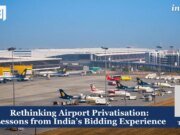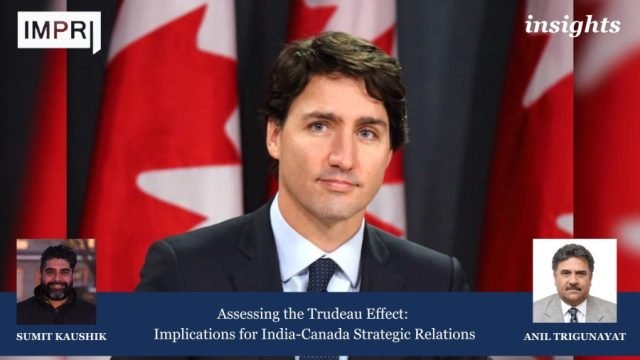Anil Trigunayat
Sumit Kaushik
Canadian Prime Minister Justin Trudeau recently found himself in the spotlight again as India has expelled six Canadian diplomats. The India-Canada relations have had to go through a lot of tumultuous times during his period before they have hit rock bottom for which PM Justin Trudeau is singularly responsible. But the kind of politician Trudeau is, one thing seems to be clear: “Elections are Coming” which have provoked immature diplomacy on his part.
Indian Ministry of External Affairs rightly and firmly called out the Prime Minister Trudeau’s unsubstantiated allegations and irresponsible actions terming Indian diplomats as the “Persons of Interest” in the Nijjar killing in June 2023. The Government of India strongly rejects these preposterous imputations and ascribes them to the political agenda of the Trudeau Government that is centred around vote bank politics.
Since Prime Minister Trudeau made certain allegations in September 2023, the Canadian Government has not shared a shred of evidence with the Government of India, despite many requests from the later’s side. The latest step follows interactions that have again witnessed assertions without any facts. This leaves little doubt that on the pretext of an investigation, there is a deliberate strategy of smearing India for political gains.
The recent saga seems to be the continuation of events that started almost a year ago during the G20 summit held last year in Delhi. His trip was then marked by a series of intriguing incidents that captivated media attention. The saga began with Trudeau’s unconventional choice of accommodations. Rather than opting for the luxurious presidential suite prepared for him, he surprised Indian intelligence officers by opting for a more modest common room.
However, the real drama unfolded when his planned three-day visit to India unexpectedly stretched into five days. The unforeseen extension was caused by a last-minute plane breakdown, which occurred just hours before his scheduled departure. This unexpected twist kept Trudeau in India longer than anticipated and added an unexpected chapter to his visit.
The focal point of media attention intensified as Prime Minister Justin Trudeau returned home and publicly accused India of involvement in the assassination of Sikh extremist leader Hardeep Singh Nijjar. The situation gained even more prominence when The New York Times revealed that the US had provided information substantiating Trudeau’s allegations against India.
These statements further inflamed the already strained Canada-India relationship. Consequently, both countries took the unprecedented step of reducing the size of their embassies by recalling diplomats, exacerbating the diplomatic tensions. India also introduced a parity principle regarding the number of diplomats.
This is not the first instance where Trudeau and his government officials have made statements that appear to be critical of India. They have consistently engaged in such actions, at times pointing fingers at India and its intelligence agencies. One notable incident occurred in 2018 when a photograph of Sophie Grégoire Trudeau, the wife of Prime Minister Justin Trudeau, alongside Jaspal Atwal surfaced in the media.
Atwal was not an ordinary individual; he was a Khalistani separatist who had been convicted for the attempted murder of Malkiat Sidhu, a former Punjab Cabinet Minister, on Vancouver Island in 1986 (Sidhu miraculously survived the attack). Atwal had also faced allegations from former Canadian Health Minister Ujjal Dosanjh of assaulting him with an iron rod in 1985.
The photograph of Sophie Grégoire Trudeau along with Atwal was followed by more images, one of which depicted Atwal as a guest at a dinner hosted by the Canadian High Commissioner in Delhi. In an attempt to deflect accusations of sympathising with Khalistani separatists, Canadian authorities resorted to blaming India and its intelligence agencies for allegedly conspiring to undermine Trudeau’s visit to India.
Trudeau has a track record of straining relations with friendly nations due to his outspoken statements. One notable instance occurred at the G-7 summit in May when he delivered a lecture on LGBTQ rights to Italian Prime Minister Giorgia Meloni. His comments have also caused tension with Australia, Brazil, and China. Trudeau often assumes a moral high ground, seemingly unafraid of offending any friendly country whose views don’t align with his own. However, this moral high ground appears increasingly questionable when scrutinised.
While Trudeau frequently emphasises the values of free speech and liberalism, especially in the context of farm protests in India, his actions within his own country have often contradicted these principles. His recent decision to employ the Emergencies Act, a measure never before used in Canada, to quash peaceful anti-vaccine mandate protests is a striking example. This move has raised doubts about his self-proclaimed liberal image as a leader, prompting questions about his commitment to the principles he espouses.
He has invoked sovereignty in this regard, but there is a stark difference — while he seeks to protect sovereignty by promoting and nurturing extremists, separatists, and terrorists, India aims to protect its security through a fight against terrorism and separatism. Even though Canada is an important country but not so important that they can get away by impinging on India’s security interests rather than preventing and controlling such acts on their soil.
Under Trudeau’s leadership also likewise since his father Trudeau Senior’s premiership, Canada has increasingly become a sanctuary for terrorists, exemplified by 17 pending extradition requests from India. Canada’s historical leniency towards extremists has escalated during Trudeau’s tenure, largely driven by his political survival instincts.
He was initially lauded as a charismatic figure akin to J.FKennedy. The international press, including the notably enamoured New York Times, effusively hailed the Trudeau-led government, heralding it as a “emerging moral leader of the free world”. However, unlike JFK, Trudeau’s focus appears to be on maintaining power and appeasing his “vote-bank”, rather than leaving a lasting legacy.
Trudeau’s party failed to secure a majority to form the government in 2021, which necessitated the support of Jagmeet Singh, the Member of Parliament from Burnaby South and leader of the New Democratic Party (NDP). Jagmeet Singh has faced allegations of associations with Sikh separatism.
According to a report in The Globe and Mail, in June 2015, Singh, who was then a member of the Ontario Legislature representing the NDP, was invited to speak at a rally in San Francisco, which was framed as a “sovereignty rally.” Some of the speakers at the event advocated for an independent Sikh state and criticised India.
Furthermore, Singh was denied a visa to enter India in 2013 due to concerns about his alleged anti-India activities. This is not the first time that a liberal party candidate has had a soft stand on sikh separatism and extremism. The legacy extends back to Pierre Trudeau, Justin’s father, who was perceived to have displayed a degree of support for extremist factions. One notable incident was his decision not to extradite the prime suspect in the Air India Flight 182 Kanishka bombings. This choice was made on rather obscure grounds, citing India’s purported lack of deference to the British monarchy as a reason.
Forming a government with the support of someone who has had past associations with groups advocating against a friendly nation raises questions about Trudeau’s approach to diplomacy and international relations. The most recent ratings, following the Nijjar incident, have proven unfavourable for Trudeau.
When respondents were questioned about his performance, a significant 54% expressed their disapproval of his current role. What is particularly troubling for the Prime Minister, who is eyeing a fourth-term bid in the 2025 elections, is that a notable 38% of respondents voiced a “strong disapproval” of his performance, indicating a potential issue of voter fatigue. It is also important for Canadians to understand the flimsy and unfounded irrationality of actions on their Prime Ministers’ part which is costing a strategic relationship.
It would be prudent for both Trudeau and the Liberal Party to address and rectify the current situation before it’s too late.
Anil Trigunayat is a former Indian Ambassador;
Sumit Kaushik is a research scholar at OP Jindal University.
The article was first published in CNBC TV18 as The Trudeau Phenomenon — how is it impacting the strategic relationship between India and Canada on October 18, 2024.
Disclaimer: All views expressed in the article belong solely to the author and not necessarily to the organization.
Read more at IMPRI:
Indo-Canadian Relations at an All-Time Low: Examining the Impact on Investments
Acknowledgment: This article was posted by Avi Sharma, a research intern at IMPRI.



















